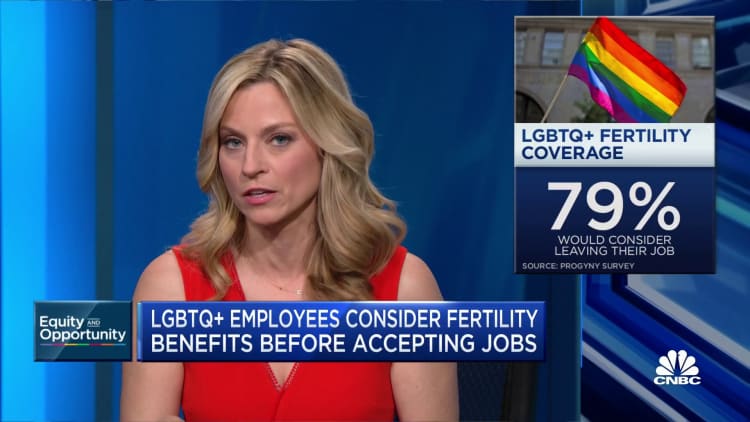
[ad_1]
Atlanta single father Jon had his son Theo after a decade of saving and strategizing with employer benefits and advocacy group help.
Jon G.
There are many paths to parenthood, and the journey is often a lot more costly for parents who rely on surrogacy.
For Jon, 41, the road to becoming a father to 5-month-old Theo involved a patchwork of financial moves: a career change, years of saving, employee benefits, family help and a grant for discounted services. Jon asked to use his first name only for privacy.
“I worked for a decade to make this family happen,” the Atlanta-based single father said.
Jon spent his early career working as a circus performer before pivoting around age 30 to return to school and pursue a job in tech — all with the goal of having a baby. “This was something I always wanted,” he said.
The path to biological children can be expensive for gay men, who may need to cover donor eggs, embryo creation, a gestational carrier, along with a slew of legal, medical and other expenses.
If someone is quoting you a really low number, you may end up with a lot of additional costs.
Rebecca Willman
Chief community engagement and programs officer with Family Equality
In total, the cost of surrogacy can vary widely, ranging from $150,000 to well over $200,000, depending on several factors, according to Rebecca Willman, chief community engagement and programs officer with Family Equality, a nonprofit dedicated to LGBTQ+ families. “If someone is quoting you a really low number, you may end up with a lot of additional costs,” she said.
‘People get really creative’ to pay for surrogacy
Jon saved around $80,000 over 10 years before starting the egg donor process in 2019. “I assumed I’d pair up with someone and they’d help pay for surrogacy,” he said. “But that never happened.”
His company didn’t initially offer fertility benefits for men. But a group of employees, mostly women, successfully pushed for expanded benefits for in vitro fertilization, adoption and gestational carriers. The enhanced coverage, which reimbursed employees for out-of-pocket expenses, reimbursed Jon $40,000 from his $170,000 total. His total included the cost of an egg donor, in vitro fertilization and gestational carrier.
“The tech sector and the financial services sector have been very proactive in offering fertility benefits,” said Anthony Brown, an attorney and manager of client services at Circle Surrogacy. “And some of them have become creative so that they get around the technical definition of infertility,” extending the benefit to same-sex couples, he added.
The tech sector and the financial services sector have been very proactive in offering fertility benefits.
Anthony Brown
Attorney and manager of client services at Circle Surrogacy
In 2022, 40% of U.S. companies offered fertility benefits compared with 30% in 2020, based on data from 502 organizations, according to the International Foundation of Employee Benefit Plans.
Still, workplace plans may cover only a fraction of the cost, and financing can be expensive amid higher interest rates. “People get really creative,” said Brown, who is also a father via surrogacy.
For example, some couples may have a baby fund in place of a wedding registry, or their family may chip in to help cover the costs. “You would be surprised by how many grandparents assist in the process,” he said.

Jon’s parents contributed $25,000 toward surrogacy costs. “They helped pay for my brother’s wedding,” he said. “So they figured this was my early wedding present — and I may never get married.”
He also used savings from his employee stock purchase program and so-called restricted stock options, which grant shares to employees at a later date.
‘You take the steps to make it happen’
Despite the enhanced workplace fertility coverage, Jon hit a roadblock after creating embryos.
He originally planned to use a close friend as his gestational carrier, which would have provided significant savings, but the plan crumbled for medical reasons. Three other friends also fell through as prospective carriers. “I had to take a pause after creating embryos,” Jon said.
After the setback, he applied for a grant through Men Having Babies, an international nonprofit focused on education and funding for LGBTQ+ men and trans women who want to become biological parents.
The organization’s Gay Parenting Assistance Program, or GPAP, facilitates more than $1 million annually in discounted or free services and cash grants to eligible parents.
“People tend to assume that [parenthood] is more out of reach than it is,” said Ron Poole-Dayan, executive director and board member of Men Having Babies. But education is critical before embarking on surrogacy, which he describes as the “most complex financial undertaking of your life.”
In 2021, GPAP approved Jon for about $8,500 of discounted services and he used those discounts to find the gestational carrier who gave birth to his son, Theo, in January.
“When you know what you want in life, you take the steps to make it happen,” he said. “And it took me a decade to get there.”
[ad_2]
Source link